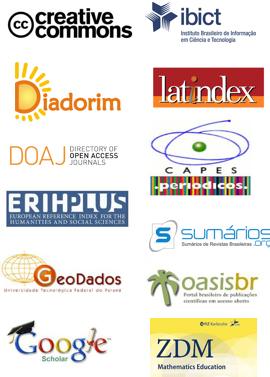Conhecimento Profissional de Professores dos Anos Iniciais do Ensino Fundamental Sobre Espaço Amostral e Quantificação de Probabilidades
DOI:
https://doi.org/10.17921/2176-5634.2020v13n4p410-419Resumo
Resumo
Neste texto, discutiu-se parte de uma investigação de Doutorado que teve o objetivo de analisar o desenvolvimento profissional de professores que lecionam Matemática para os Anos Iniciais do Ensino Fundamental em seu trabalho com Probabilidade. Para este artigo, focou-se nos conhecimentos dos participantes referentes à compreensão de espaço amostral e quantificação de probabilidades, manifestados em uma tarefa proposta durante uma formação. Adotando uma metodologia qualitativa, procurou-se descrever e interpretar as resoluções, registradas nos protocolos dos professores, e suas discussões, coletadas em vídeos e áudios gravados. Analisou-se os resultados à luz de teorias e investigações a respeito do ensino e da aprendizagem de Probabilidade e do conhecimento matemático para o ensino da temática. As resoluções, as discussões e as reflexões acerca das noções probabilísticas implicadas na situação analisada desenvolveram e ampliaram os Conhecimentos Comum de Conteúdo e também os Conhecimentos Especializados dos professores, o que, certamente, permitir-lhes-á, no ensino, antecipar erros de seus alunos, identificar possíveis causas, justificá-las do ponto de vista da Matemática e, consequentemente, buscar estratégias de intervenção que favoreçam sua compreensão e sua aprendizagem. Ressaltou-se, nesse processo de desenvolvimento e/ou ampliação dos conhecimentos, a importância de cursos de formação que conduzam à reflexão de questões ligadas tanto ao ensino como à aprendizagem, neste caso, de conceitos matemáticos e, mais especificamente, de noções probabilísticas com crianças em fase inicial de escolarização.
Palavras-chave: Formação Contínua. Conhecimento Profissional Docente. Anos Iniciais do Ensino Fundamental. Ensino de Probabilidade.
Abstract
In this text, it is discusses part of a Doctoral investigation which aimed analyzing the teachers professional development that teach Mathematics for Elementary School Initial Series, on its work with Probability. For this article, we focused on the participants’ knowledges regarding the comprehension of sample space and probabilities quantification, expressed in a purposed during a formation. Adopting a qualitative methodology, it was aimed to describe and interpret the resolutions, registered in the teachers protocols and their discussions collected in recorded videos audio. The results were analyzed based on theories and investigations regarding the Probability teaching and learning and the mathematical knowledge for the thematic teaching. The resolutions, the long discussions and lots of reflection about the probabilistic notions implied in the analyzed situation, have developed and amplified the teachers´ Content Common Knowledge as well as the Specialized Knowledges, what certainly will enable them to anticipate mistakes from their students, identify possible causes, justify them from the Mathematics point of view and, consequently, look for interventional strategies that promote the comprehension and learning. Iin this process, the knowledge development and/or amplification, the importance of formative courses that take the reflection of issues related to both teaching and learning, in this case, the mathematical concepts and, more specifically, the probabilistic notions whith children in schooling initial phase.
Keywords: Continuous Formation. Teacher Professional Knowledge. Elementary School Initial Series. Probability Teaching.


